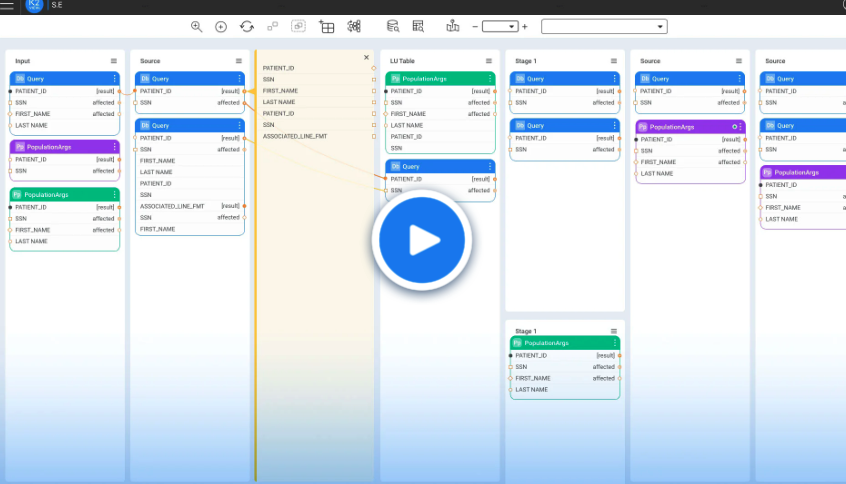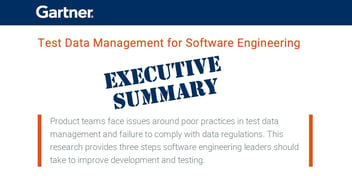Thinking of using an open-source test data management tool? Think again. Here’s why open source isn’t a viable option for enterprise-grade test data management.
The Importance of Test Data Management
Access to reliable, realistic, and diverse test data is essential for any software development and testing team. Complete, high-quality test data ensures the accuracy and completeness of test scenarios, helping teams identify and fix potential issues before they reach production environments.
By allowing organizations to utilize test data more effectively and quickly, test data management tools improve the quality of testing and accelerate the development process. Enterprises employ these tools to achieve these results, while also protecting personal and sensitive data.
Get the latest Gartner report on test data management.
How to choose a Test Data Management Tool
When choosing a test data management tool, there are a few important capabilities you should insist on:
-
Ability to provision data from multiple sources
Choose a tool that enables you to extract test data from every type of data source you have in your organization, be it relational, non-relational databases or mainframes. You should also be able to refresh test data as needed (whether on demand or on a schedule). After all, the goal of any test data management tool is to improve testing productivity and remove test data roadblocks. Giving your team access to the test data they need, when they need it, is the cornerstone of any good test data management tool.
-
Subsetting data
A test data management tool also needs to give teams a robust choice when it comes to sampling and subsetting. For many test scenarios, a small subset is all that's necessary to test software functionality. Companies save resources, by not having to clone an entire database.
-
Data masking
Data Masking is another must have, especially for industries that collect personal, individual information, which is subject to stringent data privacy regulations. The tool you choose should not only be able to automatically discover Personally Identifiable Information (PII) but also utilize a variety of data masking techniques to protect it. You should be able to mask both structured and unstructured data while maintaining relational integrity and consistency. Masking data in flight gives teams the ability to stay agile while also protecting user privacy.
-
Synthetic data generation
Generating synthetic data is also quickly becoming essential for any test data management tool. Synthetic data can help fill out datasets that may be incomplete or biased, as well as supplying a large amount of test data on demand when real data is not available.
-
Data transformation
Companies should have the ability to mask, tokenize, synthesize, age, version, reverse, and rollback their test datasets in a single, end-to-end test data management solution.
It’s important to note that while various open-source tools may support some of these capabilities, there is no open-source tool that can provide the full functionality of a true test data management solution.
What are Open-Source Tools?
Open-source tools differ from commercially available solutions in several ways, including licensing, cost, flexibility, and vendor support.
They are typically distributed under open-source licenses, such as GPL, MIT, or Apache, which means they are freely available to use, modify, and distribute, without any upfront licensing fees. This makes open-source tools an attractive option, particularly for smaller organizations or projects with budget constraints.
Additionally, open-source tools are typically more flexible and customizable than proprietary tools. Teams can modify the source code to meet specific project demands, giving organizations the ability to tailor the tool to their exact needs.
Open-source tools often have active and collaborative communities of developers and users. This means regular updates, bug fixes, and community-driven enhancements. Community support is often available through forums, documentation, and online resources, making it easier to troubleshoot and learn.
Challenges with Open-Source Test Data Management Tools
Open-source tools have a few key challenges to beware of:
-
Not a “real” test data management tool
Open-source tools tend to focus on one aspect of the test data management funnel. Some tools help teams create synthetic data, while others may focus on data anonymization. However, no single tool is an end-to-end test data management solution. Single-function offerings may seem tempting as a short-term fix, but they end up costing plenty in the long run.
-
Potential for serious liability
It’s not unusual for PII to fall between the cracks and wind up in testing environments when using open-source tools. They may not be as reliable or just not perform well when running masking functions on tables.
-
Learning curve
Open-source tools generally have a steeper learning curve and are sometimes not scalable. Since they are often highly configurable and require hands-on development, engineers might need more time to become proficient with the tool. Investing time early on may not pay off later if you’re using a tool that can’t fully support your organization’s needs.
-
Limited support and maintenance
Open-source tools lack the comprehensive customer support that commercial tools have. Often, open-source tools rely on online communities for assistance, which isn’t reliable for enterprise teams. Additionally, while such communities actively maintain many different open-source tools, the burden of maintenance and updates may fall more on the engineer's shoulders.
-
Integration complexity
Integrating open-source tools with the existing software in your testing and development stack can sometimes be more complex, because it often involves custom development work.
While at first glance, open-source tools may seem attractive in terms of cost, flexibility, and community support, they are not options for enterprises seeking a robust solution.
Top 6 Open-Source Test Data Management Tools
Here are the top 6 tools to consider when choosing an open-source test data management tool.
-
TestLink
TestLink offers a comprehensive set of features for test case management, defect tracking, and reporting. It allows teams to create, organize, and monitor test cases within test suites and plans, while also providing defect tracking with assignable statuses. TestLink's reporting capabilities are customizable to suit team-specific requirements, and its integration options with bug tracking and build management systems streamline the testing process. As a free and open-source solution, TestLink is accessible to teams of all sizes, offering user-friendliness without the need for extensive training. However, customization can be challenging, and due to its open-source nature, support may be limited. Additionally, being web-based, security considerations are pertinent.
-
Jailer
Jailer is an open-source tool specializing in database subsetting and data anonymization. It allows you to create smaller, meaningful subsets of your database, making it easier to work with during testing. Additionally, Jailer offers data masking capabilities to protect sensitive information. It supports a wide range of database systems and is particularly useful for projects that require selective data extraction.
-
FitNesse
FitNesse is an open-source test framework that incorporates test data management capabilities. It's designed for acceptance testing and is particularly suitable for projects following agile and CI/CD practices. FitNesse provides a collaborative platform for test data creation, execution, and documentation, enabling effective communication between developers, testers, and other stakeholders.
-
Greenplum Chorus
Greenplum Chorus is an open-source test data management tool that targets the data warehousing domain. It enables teams to provision data subsets from large data sets and maintain data integrity throughout the testing process. Greenplum Chorus integrates with Greenplum Database, offering a powerful solution for those working with big data and analytics projects.
-
Faker
Faker is an open-source library that simplifies the generation of test data. While not a full-fledged test data management tool, Faker is a valuable resource for generating synthetic test data. Faker provides a wide range of data types, making it easy to create realistic but fictional data for testing purposes. It is often used in combination with other test data management tools to enhance data diversity.
-
Selenium
Selenium is a free open-source tool for automating web-based applications. It enables web browser automation for tasks like logging in and form filling to cross-browser testing, ensuring compatibility across different browsers. Selenium also works for mobile app testing, emulating mobile device behavior, and even enabling performance testing by measuring page load times, request handling rates, and memory usage. Selenium caters to teams of all sizes and is accessible across Windows, Mac, and Linux platforms. However, users often say it has a steep learning curve and may not suffice as a standalone solution for comprehensive web application testing.
What’s the Best Solution for You?
When data engineers are tasked with building test data management software, searching for open-source test data management tools might be at the top of their list. After all, in this cost-cutting, budget-conscious economy, in-house solutions are very popular.
But data engineers are often far removed from the liabilities, fines, and damage to brand reputation caused by a data breach due to patchwork code.
Luckily, there’s a highly cost-effective solution on the market, with impressive ROI metrics.
Entity-based test data management tools, like K2view, are driving the market, giving organizations the ability to overcome common challenges and complexities when it comes to managing test data at scale. They provision test data from multiple systems and organize it by individual business entities (say, customers) in compressed data stores. This unique test data management approach embeds self-service provisioning, extraction from any source, data anonymization, synthetic data generation, and CI/CD pipeline integration in a single solution.
In the contest between open-source and enterprise-grade, most C-level executives would agree, “We’re not wealthy enough to buy discount.”
Learn more about K2view Test Data Management Tools.











